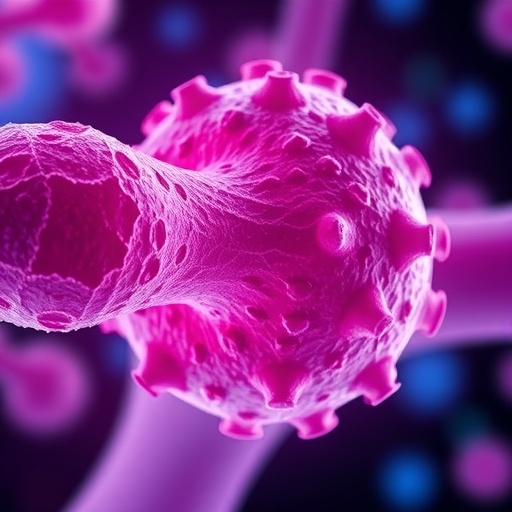In a groundbreaking study published in Science Advances, researchers from the Institut Pasteur and Inserm have unveiled a promising immunotherapeutic approach that reprograms the mode of cell death in malignant B cells to trigger a potent anti-tumor immune response. This novel strategy could revolutionize treatment paradigms for hematological malignancies such as certain lymphomas and leukemias that impact B cells. Utilizing a sophisticated preclinical model and state-of-the-art intravital two-photon microscopy, the team demonstrated that directing malignant B cells to undergo necroptosis, an immunogenic form of programmed cell death, significantly enhances tumor eradication by harnessing the body’s own immune defense mechanisms.
The current immunotherapy landscape focuses heavily on activating the immune system to recognize and eliminate cancerous cells. However, one persistent challenge lies in effectively presenting tumor antigens to immune cells to ensure a robust and lasting immune response. Unlike apoptosis, which is typically silent and non-inflammatory, necroptosis provides a distinct advantage by releasing danger-associated molecular patterns (DAMPs) that act as “danger signals.” These signals recruit and activate surrounding immune effector cells, such as macrophages and T cells, effectively turning the dying tumor cells into an in situ vaccine that primes immune surveillance against cancer.
Leading the research, Dr. Philippe Bousso and his team at the Dynamics of Immune Responses Unit took a particular interest in exploiting necroptotic pathways in malignant B cells. Initial observations revealed a molecular barrier: the key effector protein MLKL, indispensable for executing necroptosis, was conspicuously absent in these cancerous cells. This discovery underscored a significant hurdle, as the absence of MLKL impedes the induction of necroptotic cell death, thus blunting the immunogenic potential of tumor cell demise.
To overcome this molecular deficiency, researchers innovatively deployed a triple drug regimen, combining clinically approved agents in a novel sequence and dosage. This therapeutic cocktail bypassed the MLKL-dependent blockade, successfully reinstating necroptosis pathways within malignant B cells. The induced necroptosis resulted not only in tumor cell death but also in a pronounced activation of the immune system, culminating in complete leukemia clearance in their animal models.
The use of two-photon intravital microscopy was pivotal in this study, allowing the team to visualize cellular interactions and dynamics in real time within living tissues. This technique illuminated the intricate crosstalk between dying cancer cells and immune populations such as macrophages and cytotoxic lymphocytes. In particular, they could observe how necroptosis seemed to spatially and temporally orchestrate immune cell recruitment and activation, a feat unattainable with conventional imaging methods.
By reprogramming the death modality of cancer cells, this approach effectively transforms malignant cells into immunostimulatory entities that galvanize host immunity. This finding represents a paradigm shift in immuno-oncology, suggesting that the manner of tumor cell death is as critical as the mere induction of death itself for therapeutic efficacy. Necroptosis, as triggered by their triple therapy, offers a unique mechanism to break immune tolerance and stimulate sustained immune-mediated tumor control.
This research holds particular promise for hematological cancers where conventional therapies sometimes fail due to immune evasion mechanisms. By making tumor cells inherently more visible and provocative to the immune system, the new therapy could reduce relapse rates and improve long-term survival outcomes. Moreover, since the drugs utilized are already in clinical use, transitioning this therapy into human trials may be expedited, offering hope for patients with otherwise refractory B cell malignancies.
The study also highlights the importance of the tumor microenvironment in shaping therapeutic responses. Researchers observed that in vivo, the necroptotic death of tumor cells enhanced local inflammatory cues, reshaping the immune landscape to favor anti-tumor activity. This suggests that future therapies might not only target cancer cells directly but also modulate the microenvironment to sustain immune function and prevent tumor regrowth.
Intriguingly, the research deepens understanding of programmed cell death pathways and their immunological implications. While apoptosis traditionally has been viewed as a quiet cell death limiting overactive immune responses, necroptosis emerges here as a process with considerable immunological benefit in cancer treatment by tipping the balance towards immune activation. This may inspire further investigation into the diverse roles of cell death in disease contexts beyond oncology.
In summation, by manipulating RIPK3-mediated necroptosis to transform the fate of malignant B cells, the scientists have paved a new avenue for immune-mediated tumor control. The findings underscore the potential for combinatorial approaches that integrate molecular insights into cancer cell death with immunotherapy to yield next-generation cancer treatments. Continued exploration in this arena may eventually yield efficacious, durable therapies that circumvent immune escape and improve quality of life for patients worldwide.
This landmark study received funding from the European Research Council and the ARC Foundation for Cancer Research, underscoring the critical value of sustained investment in innovative cancer research. As immunotherapy continues to evolve, approaches like this one fundamentally advance the field, offering new strategies to empower the immune system to combat cancer more effectively.
Subject of Research: Animals
Article Title: Reprogramming RIPK3-induced cell death in malignant B cells promotes immune-mediated tumor control
News Publication Date: 15-Aug-2025
Web References: https://www.science.org/doi/10.1126/sciadv.adv0871
References: Alonso R., Garcia Z., Corre B., Lemaître F., Vaganay C., Saklani H., Grandjean C. L., Yatim N., Bousso P. (2025). Reprogramming RIPK3-induced cell death in malignant B cells promotes immune-mediated tumor control. Science Advances. DOI: 10.1126/sciadv.adv0871
Image Credits: © Dynamics of Immune Responses Unit – Institut Pasteur
Keywords: Immunotherapy, Cancer, Blood cancer, Leukemia




